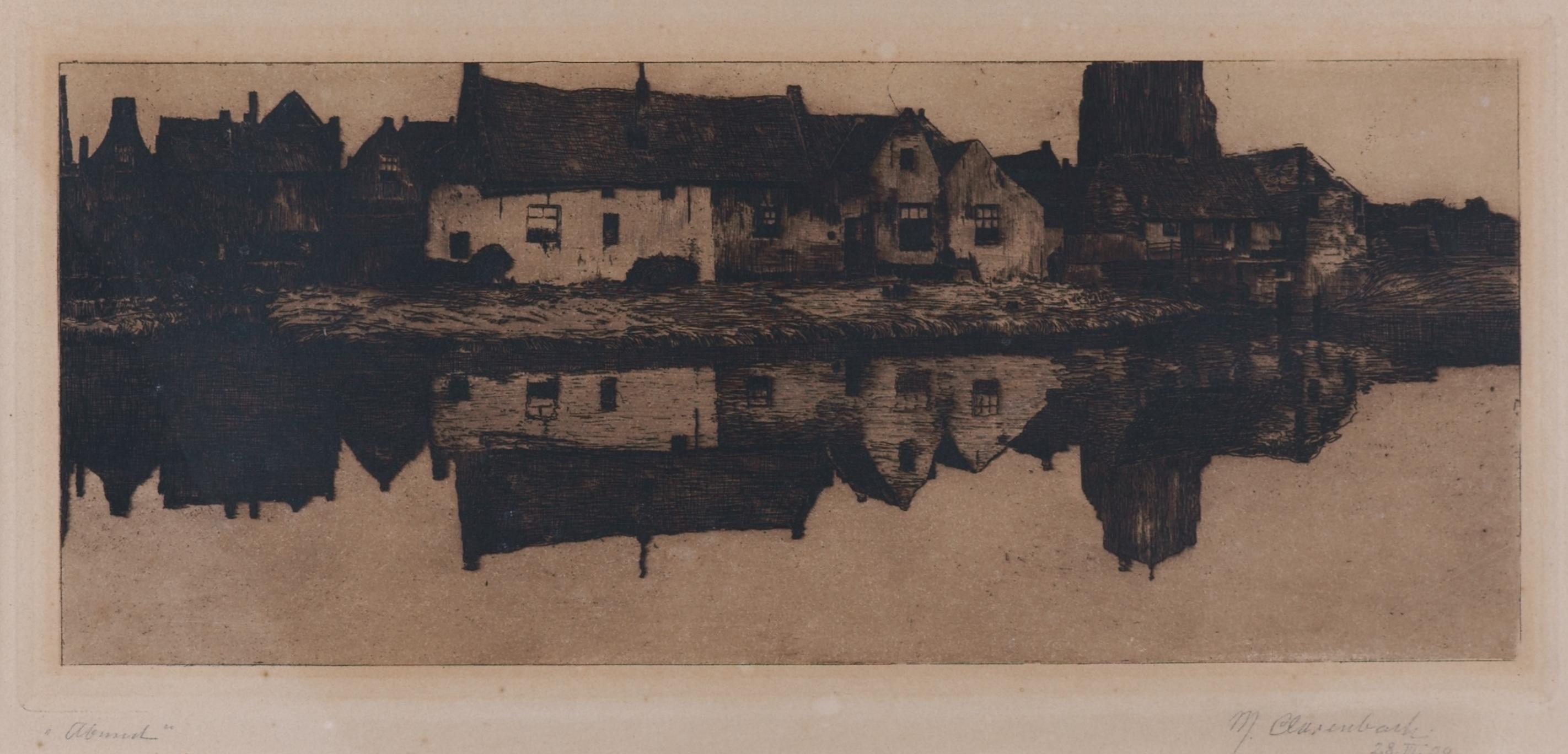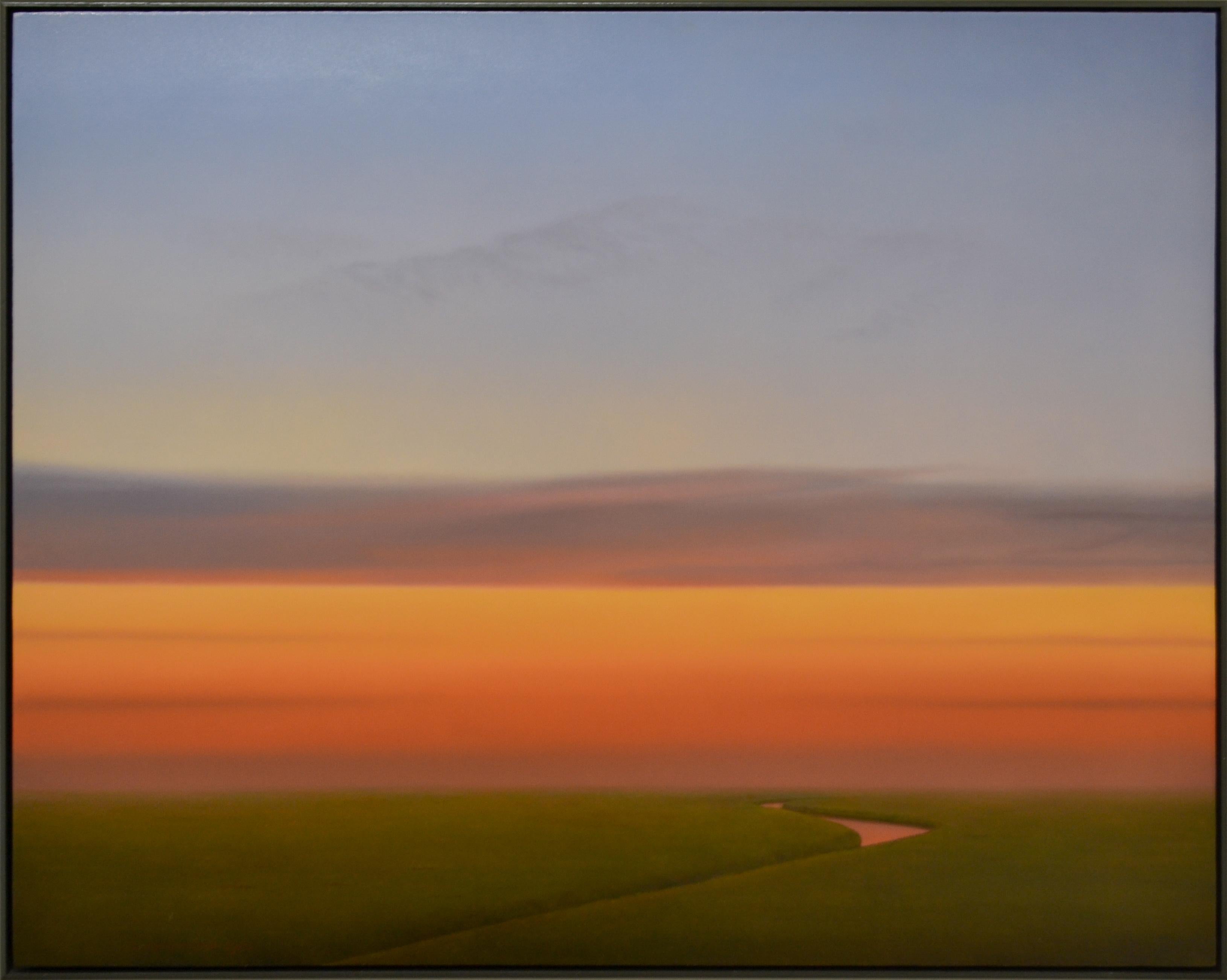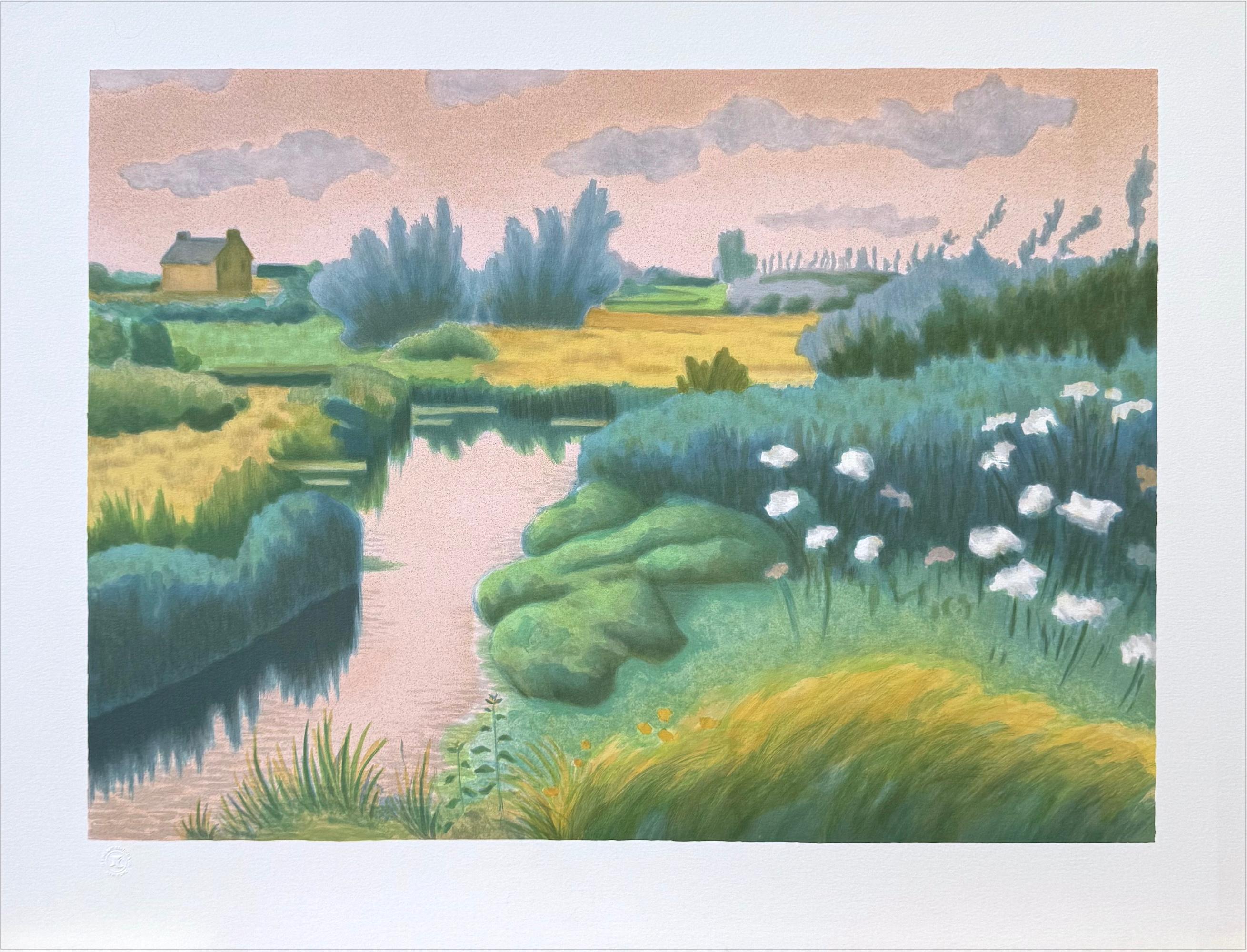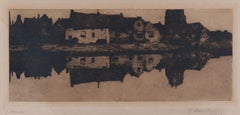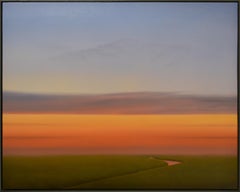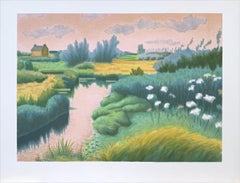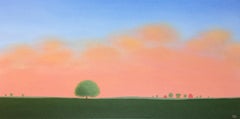Items Similar to Somme, Coucher de Soleil
Want more images or videos?
Request additional images or videos from the seller
1 of 8
Roger HebbelinckSomme, Coucher de Soleilc.1965
c.1965
$500
£377.34
€431.99
CA$705.17
A$774.18
CHF 403.89
MX$9,368.71
NOK 5,062.18
SEK 4,769.90
DKK 3,224.71
About the Item
Artist: Roger Hebbelinck (Belgian, born 1912)
Title: Somme, Coucher De Soleil
Year: Circa 1965
Medium: Color Etching
Edition: Numbered 109/300 in pencil
Paper: Wove
Size image: 10.5 x 20 inches
paper: 19.5 x 25.75 inches
Signature: Hand signed in pencil by the artist
Publisher: Stehli Brothers L.T.D. Zurich, Switzerland
Condition: Excellent, has never been framed
About the artist:
Listed Belgian artist Roger Hebbelinck (1912-1987) Roger Hebbelinck was born August 12th 1912 in Brussels, Belgium. Roger Hebbelinck studied drawing at the Academie Des Beaux Arts in Brussels under Professors: Stevens, Van Strydonck & Delville, in whose class Hebbelinck achieved a first for antique figure drawing. Later he took up oil painting under the tuition of Professor Bastien and also landscape painting in particular under Nathieu. Roger Hebbelinck also studied the history of art of human and animal anatomy as well as history of costume. Further studies were devoted to the designing of the human body, under Professor Dierick, at the academy of Fine Arts in Brussels & watercolour under the direction of I.S Van Mens, the noted Dutch Aquarelliste. Hebbelinck's work was regularly shown in exhibitions in Belgium and France and is represented in many important collections.
- Creator:Roger Hebbelinck (1912 - 1987)
- Creation Year:c.1965
- Dimensions:Height: 19.75 in (50.17 cm)Width: 25.5 in (64.77 cm)Depth: 0.01 in (0.26 mm)
- Medium:
- Movement & Style:
- Period:
- Condition:
- Gallery Location:San Francisco, CA
- Reference Number:Seller: hebb/sm/cou/011stDibs: LU66636117032
About the Seller
5.0
Platinum Seller
Premium sellers with a 4.7+ rating and 24-hour response times
Established in 1999
1stDibs seller since 2017
839 sales on 1stDibs
Typical response time: 1 hour
- ShippingRetrieving quote...Shipping from: San Francisco, CA
- Return Policy
Authenticity Guarantee
In the unlikely event there’s an issue with an item’s authenticity, contact us within 1 year for a full refund. DetailsMoney-Back Guarantee
If your item is not as described, is damaged in transit, or does not arrive, contact us within 7 days for a full refund. Details24-Hour Cancellation
You have a 24-hour grace period in which to reconsider your purchase, with no questions asked.Vetted Professional Sellers
Our world-class sellers must adhere to strict standards for service and quality, maintaining the integrity of our listings.Price-Match Guarantee
If you find that a seller listed the same item for a lower price elsewhere, we’ll match it.Trusted Global Delivery
Our best-in-class carrier network provides specialized shipping options worldwide, including custom delivery.More From This Seller
View AllLa Vilaine, France
By Roger Hebbelinck
Located in San Francisco, CA
Artist: Roger Hebbelinck (Belgian, born 1912)
Title: La Vilaine
Year: Circa 1965
Medium: Color etching with aquatint
Edition: Numbered 30/350 in p...
Category
Mid-20th Century Realist Landscape Prints
Materials
Aquatint
Landscape with Pond
By Roger Hebbelinck
Located in San Francisco, CA
Artist: Roger Hebbelinck (Belgian, born 1912)
Title: Landscape with Pond
Year: Circa 1960
Medium: Color etching with aquatint
Edition: Numbered 43/3...
Category
Mid-20th Century Realist Landscape Prints
Materials
Aquatint
Greetziel, North Sea, Germany
By Josef Eidenberger
Located in San Francisco, CA
This artwork titled "Greetziel, North Sea, Germany" c.1950 is a color etching on Wove paper by noted Austrian artist Josef Eidenberger, 1899-1991. It is hand...
Category
Mid-20th Century Realist Figurative Prints
Materials
Etching
Schermerthorn Windmuhle, Holland
By Josef Eidenberger
Located in San Francisco, CA
This artwork titled "Schemerthorn Windmuhle, Holland" c.1950 is a color etching on Wove paper by noted Austrian artist Josef Eidenberger, 1899-1991. It is hand signed in pencil by th...
Category
Mid-20th Century Realist Figurative Prints
Materials
Etching
Paysage de Normandie
By Maurice Levis
Located in San Francisco, CA
This artwork titled "Paysage de Normandie" c.1910 Is an original color aquatint by noted French artist Maurice Levis, 1860-1940. It is hand signed and numbered 245/350 in pencil by the artist. The plate mark (image) size is 17.5 x 24.85 inches, sheet size is 19.75 x 26.75 inches. It is in excellent condition, especially considering the age of the piece.
About the artist:
Born in Paris on 11 November1860, Maurice Levis was an accomplished landscape and genre painter for nearly sixty years. His career spanned not only the early years of modernism, but also the twentieth century developments of cubism and surrealism. Levis' artistic education began in the late 1870s at the Académie Julian where he studied with Jules Lefebvre. He also studied with Henri Harpignies and with Pierre Billet...
Category
Early 20th Century Impressionist Landscape Prints
Materials
Aquatint
Dutch Landscape with Road
By George Leonard Linton Herdle
Located in San Francisco, CA
Artist: George Leonard Linton Herdle (American, 1868-1922)
Title: Dutch Lanscape with Road
Year: Circa 1910
Medium: Watercolor
Paper: Watercolor
Image size: 20.5 x 14.25 inch...
Category
Early 19th Century Impressionist Figurative Drawings and Watercolors
Materials
Watercolor
You May Also Like
Evening - The depth of the visible -
Located in Berlin, DE
Max Clarenbach (1880 Neuss - Cologne 1952), Evening. Etching, 18 x 41 cm (platemark), 33.5 x 57 cm (frame), inscribed "Abend" in pencil at lower left, signed and dated "M. Clarenbach. 28.III.[19]09". Framed and mounted under glass.
- Somewhat browned and slightly foxed.
About the artwork
The horizontally elongated etching depicts the panoramic view of a small town as seen from the other side of the river. There are gabled houses on the left and a mighty church spire on the right. The bourgeois houses and the large religious building indicate the urban character. These buildings are rendered in dark tones to emphasise the lighter row of houses in the centre of the picture, closer to the water. The chiaroscuro contrast creates two parallel planes that open up a space for the imagination of what the city could be. The imagination is stimulated by the almost entirely dark, barely recognisable buildings, while the arm of the river leading into the city further stimulates the imagination.
However, as the silhouette of the city as a whole is reflected in the water, the parallel planes are perceived as a band of houses that stretches across the entire horizontality of the etching and seems to continue beyond the borders of the picture. The reflection has almost the same intensity as the houses themselves, so that the band of buildings merges with their reflection to form the dominant formal unit of the picture. Only the parallel horizontal hatching creates the convincing impression of seeing water, demonstrating Max Clarenbach's mastery of the etching needle.
The water is completely motionless, the reflection unclouded by the slightest movement of the waves, creating a symmetry within the formal unity of the cityscape and its reflection that goes beyond the motif of a mere cityscape. A pictorial order is established that integrates everything in the picture and has a metaphysical character as a structure of order that transcends the individual things. This pictorial order is not only relevant in the pictorial world, but the picture itself reveals the order of the reality it depicts. Revealing the metaphysical order of reality in the structures of its visibility is what drives Clarenbach as an artist and motivates him to return to the same circle of motifs.
The symmetry described is at the same time inherent an asymmetry that is a reflection on art: While the real cityscape is cut off at the top of the picture, two chimneys and above all the church tower are not visible, the reflection illustrates reality in its entirety. The reflection occupies a much larger space in the picture than reality itself. Since antiquity, art has been understood primarily as a reflection of reality, but here Clarenbach makes it clear that art is not a mere appearance, which can at best be a reflection of reality, but that art has the potential to reveal reality itself.
The revealed structure of order is by no means purely formalistic; it appears at the same time as the mood of the landscape. The picture is filled with an almost sacred silence. Nothing in the picture evokes a sound, and there is complete stillness. There are no people in Clarenbach's landscape paintings to bring action into the picture. Not even we ourselves are assigned a viewing position in the picture, so that we do not become thematic subjects of action. Clarenbach also refrains from depicting technical achievements. The absence of man and technology creates an atmosphere of timelessness. Even if the specific date proves that Clarenbach is depicting something that happened before his eyes, without the date we would not be able to say which decade, or even which century, we are in. The motionless stillness, then, does not result in time being frozen in the picture, but rather in a timeless eternity that is nevertheless, as the title "Abend" (evening), added by Clarenbach himself, makes clear, a phenomenon of transition. The landscape of the stalls is about to be completely plunged into darkness, the buildings behind it only faintly discernible. The slightly darkened state of the sheet is in keeping with this transitional quality, which also lends the scene a sepia quality that underlines its timelessness. And yet the depiction is tied to a very specific time. Clarenbach dates the picture to the evening of 28 March 1909, which does not refer to the making of the etching, but to the capture of the landscape's essence in the landscape itself.
If the real landscape is thus in a state of transition, and therefore something ephemeral, art reveals its true nature in that reality, subject to the flow of phenomena, is transferred to an eternal moment, subject to a supra-temporal structure of order - revealed by art. Despite this supratemporality, the picture also shows the harbingers of night as the coming darkening of the world, which gives the picture a deeply melancholy quality, enhanced by the browning of the leaf.
It is the philosophical content and the lyrical-melancholic effect of the graphic that give it its enchanting power. Once we are immersed in the image, it literally takes a jerk to disengage from it.
This etching, so characteristic of Max Clarenbach's art, is - not least because of its dimensions - a major work in his graphic oeuvre.
About the artist
Born into poverty and orphaned at an early age, the artistically gifted young Max Clarenbach was discovered by Andreas Achenbach and admitted to the Düsseldorf Art Academy at the age of 13.
"Completely penniless, I worked for an uncle in a cardboard factory in the evenings to pay for my studies.”
- Max Clarenbach
At the academy he studied under Arthur Kampf, among others, and in 1897 was accepted into Eugen Dücker...
Category
Early 1900s Realist Landscape Prints
Materials
Etching
$558 Sale Price
20% Off
Sunset - Gerrit Wijngaarden, 21st Century Contemporary Dutch Oil Painting
By Gerrit Wijngaarden
Located in Nuenen, Noord Brabant
Gerrit Wijngaarden from Friesland likes to paint "the silence".
We have a very special self-portrait of this artist for the exhibition around Vince...
Category
2010s Contemporary Landscape Paintings
Materials
Oil
BRITTANY LANDSCAPE Hand Drawn Lithograph, Impressionist Style Waterway Scene
By Laurent Marcel Salinas
Located in Union City, NJ
Artist - Laurent Marcel Salinas (born 1913 Alexandria, Egypt, died 2010 in America)
Title - BRITTANY LANDSCAPE
BRITTANY LANDSCAPE is an original hand drawn limited edition lithograp...
Category
1970s Realist Landscape Prints
Materials
Lithograph
Sunset over the Old Farmstead
By Sharon France
Located in San Francisco, CA
Artist Comments
The wide open views found in the heartland are one of the things that I love most about the country. Sunset skies are one of my favorite inspirations;to paint this long view of a little farm against the clouds, just as the sun has dipped below the horizon.
About the Artist
Sharon France...
Category
21st Century and Contemporary Contemporary Landscape Paintings
Materials
Acrylic
Sunset - XXI Century, Contemporary Landscape Oil Painting, Realistic
By Janusz Szpyt
Located in Warsaw, PL
Janusz Szpyt was born in 1960, he is a Polish painter. He graduated from the Graphic design faculty and painting from the Academy of Fine Arts in Krakow. 1983 onward, he became the m...
Category
2010s Realist Landscape Paintings
Materials
Oil, Board
FERNAND AUDET (1923-2016) FRENCH IMPRESSIONIST OIL - SUNSET OVER WINDMILLS
By Fernand Audet
Located in Cirencester, Gloucestershire
"Sunset"
by Fernand Audet (French, Tarascon 1923- Mulhouse 2016)
signed
oil painting on board, unframed
painting: 13 x 16 inches
A fine 20th century oil painting by the listed Fre...
Category
Mid-20th Century Post-Impressionist Landscape Paintings
Materials
Oil
